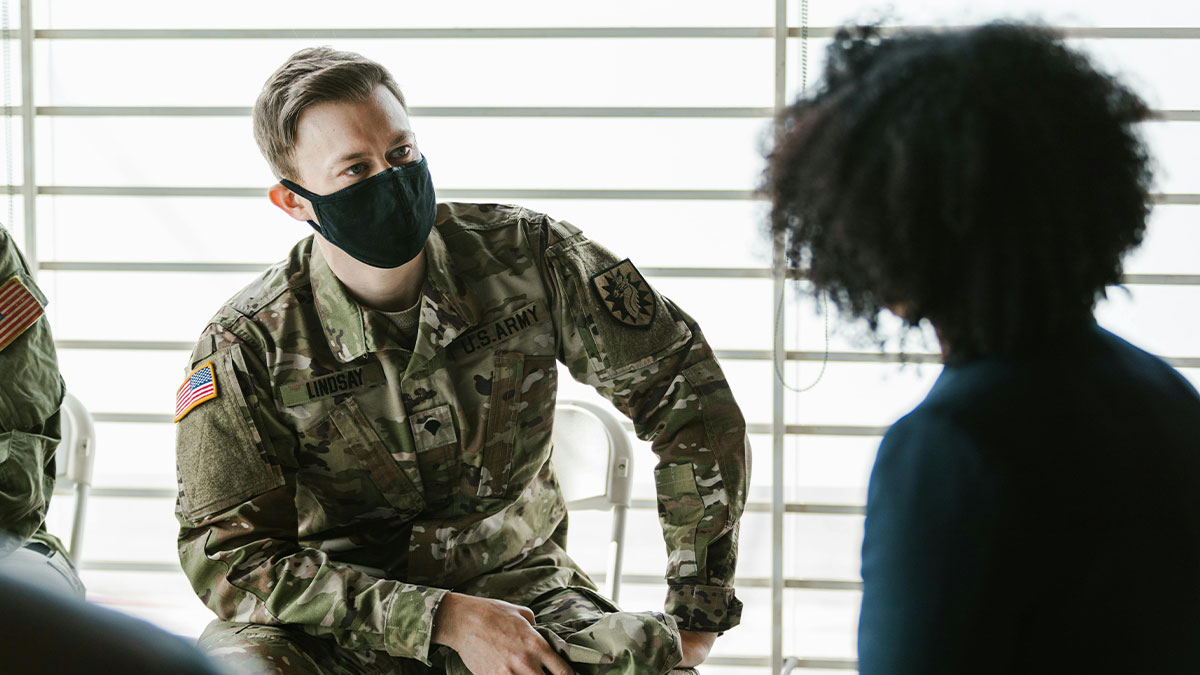It is crucial for veterans dealing with depressionA mental health condition marked by persistent feelings of sadness and loss of interest. to find support. The Veterans Crisis Line offers immediate help 24/7. The VA Mental Health Resources provide specialized care for PTSD, anxiety, and depression. SAMHSA and the Warrior Care Network offer extensive mental health programs. The Disaster Distress Helpline and National Helpline are available round the clock for crisis support. Websites like FindTreatment.gov make locating treatment facilities easy, and organizations like the Wounded Warrior ProjectA U.S. nonprofit organization that provides programs and services to meet the needs of wounded veter... provide free mental health servicesProfessional services that support individuals in managing mental health conditions, such as therapy.... Peer SupportA system where individuals with disabilities provide support and share experiences to help each othe... Services also offer personalized assistance to reduce isolation. There's plenty more to discover about these essential resources.
Key Takeaways
- VA Mental Health Resources: Specialized support for veterans dealing with PTSD, anxiety, and depression through various treatment options.
- Warrior Care Network: Intensive mental health program providing tailored therapies for PTSD, anxiety, and depression.
- Wounded Warrior Project: Free mental health services and support programs specifically designed for veterans.
- FindTreatment.gov: Directory connecting veterans to over 13,000 mental health treatment facilities nationwide.
Veterans Crisis Line
The Veterans Crisis Line offers immediate and confidential support to veterans in crisis by dialing 988 and pressing 1. When we find ourselves or a fellow veteran in a crisis, knowing there's accessible and reliable support can make all the difference.
The Veterans Crisis Line is designed to provide the essential support we need during these challenging moments. Whether we're struggling with mental health care issues or other personal crises, this service is a lifeline.
For those of us who might prefer not to call, there are other options available. We can start a confidential chat online, which guarantees we get the same level of support in a format that might feel more comfortable. Texting 838255 connects us directly with trained responders who understand the unique challenges veterans face. And for veterans with hearing lossPartial or total inability to hear sounds in one or both ears., dialing TTY: 711 then 988 provides access to the same vital support.
The significance of this service can't be overstated. It's designed to address our immediate needs in a crisis, offering a compassionate ear and professional guidance. By reaching out, we're taking an important step in securing the mental health care and support we deserve.
VA Mental Health Resources

Let's explore the VA mental health resources available to veterans. These services provide tailored support for PTSD and anxiety, addressing the unique challenges veterans face.
We'll also look at the veteran-specific treatment options designed to enhance mental well-being.
PTSD and Anxiety Support
Veterans facing PTSD and anxiety can access a wide range of tailored support services through the VA. These resources are designed to address the unique stressors that veterans encounter, providing thorough care for PTSD treatment, anxiety, and depression. The VA's mental health services are committed to ensuring that veterans receive the support they need to manage and overcome these challenges.
Here are three key services available through the VA:
1. PTSD Treatment Programs:
The VA offers specialized programs that use evidence-based therapies like Cognitive Processing Therapy (CPT) and Prolonged Exposure (PE) therapy. These programs help veterans process traumatic experiences and reduce PTSD symptoms.
2. Anxiety Management Support:
Veterans can access tailored anxiety management support through individual counselingProfessional guidance to help individuals cope with emotional, mental, or social challenges, particu..., support groups, and medication management. These services aim to help veterans develop coping strategies and manage anxiety effectively.
3. Thorough Depression Care:
The VA provides a holistic approach to treating depression, which includes individual therapy, medication, and support groups. This thorough care helps veterans improve their mental health and overall well-being.
Veteran-Specific Treatment Options
Accessing veteran-specific treatment options through the VA guarantees we address the unique mental health challenges our veterans face. The VA offers a range of mental health resources tailored specifically to veterans and family members, making certain their distinct experiences and needs are met. From PTSD and anxiety to depression, the VA provides programs to help veterans navigate their specific mental health challenges.
We can also rely on the VA for specialized support in areas like military sexual trauma, traumatic brain injury effects, substance use issues, and suicide prevention. These programs are designed to provide all-encompassing care that acknowledges the individual experiences of veterans.
Furthermore, the VA Health Chat service, available across all 18 VISNs, offers a convenient way for veterans to access mental health resources and support, making it easier to seek help when needed.
To make mental health treatment more accessible and affordable, veterans benefit from copay waivers for the first three annual mental health visits. This reduces financial barriers and encourages veterans to prioritize their mental health.
SAMHSA Initiatives
SAMHSA's initiatives, such as the 988 Lifeline and grant funding, play an essential role in supporting veteran mental health. These programs are vital for veterans who often face unique mental health challenges.
The 988 Lifeline, in particular, offers immediate crisis counseling and connects veterans to essential resources. SAMHSA also provides significant financial support through grants, having awarded $45.1 million to various behavioral health services to enhance mental health programs nationwide.
To dive deeper into SAMHSA's contributions:
- 988 Lifeline: This lifeline is a crucial tool for veterans in crisis. It provides immediate access to crisis counseling and peer support, ensuring that help is just a phone call away.
- Grant Funding: The $45.1 million in grants has bolstered many mental health initiatives, creating more opportunities for veterans to receive specialized care and support.
- Data and Awareness: SAMHSA's release of the 2023 NSDUH survey results offers valuable insights into substance use and mental health trends, helping to shape more effective programs and policies.
These initiatives underscore SAMHSA's commitment to improving the mental health landscape for veterans, ensuring they receive the extensive support they deserve.
FindTreatment.gov

Let's explore how FindTreatment.gov can be a lifesaver for veterans seeking mental health support.
By using this extensive online resource, we can easily locate state-licensed providers and access immediate crisis support.
Whether it's finding nearby treatment facilities or understanding different mental health conditions, this site offers critical assistance.
Locating Mental Health Providers
Finding the right mental health provider is easier with FindTreatment.gov, a thorough resource that connects you to over 13,000 facilities nationwide. This platform is invaluable for veterans seeking mental health treatment facilities that offer a range of services, from therapy and counseling to medication management. The user-friendly interface simplifies the search process, allowing us to filter results based on location, insurance, and specific treatment needs.
Navigating through FindTreatment.gov, we can efficiently locate mental health providers that meet our requirements. Here's how we can make the most of this tool:
- Search by Location: Enter your ZIP code or city to find nearby mental health treatment facilities. This helps us identify accessible options without extensive travel.
- Filter by Insurance: FindTreatment.gov allows us to filter providers based on accepted insurance plans, guaranteeing we find services within our coverage.
- Specify Treatment Needs: We can refine our search by selecting specific services, such as individual therapy, group counseling, or specialized veteran programs.
This extensive directory guarantees we can connect with the mental health care we need in a confidential and straightforward manner. By leveraging these search capabilities, we can take a significant step toward improving our mental health and well-being.
Accessing Immediate Crisis Support
In addition to locating mental health providers, FindTreatment.gov also offers immediate crisis support resources for veterans experiencing depression. This platform is invaluable for veterans who need urgent assistance, providing an easy and efficient way to access mental health services. The website's inclusive directory includes crisis hotlines and treatment facilities specifically tailored for depression support services.
When we're in a crisis, time is of the essence. FindTreatment.gov ensures that veterans can quickly connect with a crisis counselor, making the process straightforward and responsive. Whether it's through a phone call or an online resource, the immediate support available can make a significant difference in moments of acute distress. The ability to find and access these resources swiftly can be lifesaving.
Furthermore, the platform is designed with user-friendliness in mind, ensuring that veterans can navigate through the options without added stress. By offering a centralized location for finding mental health services, FindTreatment.gov empowers veterans to take control of their mental health journey.
For those in urgent need of depression support services, this resource is a critical tool for finding the help they need right when they need it the most.
Disaster Distress Helpline
The Disaster Distress Helpline offers 24/7 confidential counseling for anyone dealing with emotional distress from disasters. This service is an essential resource for veterans experiencing mental health challenges triggered by natural or man-made disasters. When disaster strikes, emotional turmoil can exacerbate existing mental health issues, making immediate support essential.
Veterans can reach the helpline by calling 1-800-985-5990 or texting 'TalkWithUs' to 66746. This helpline, funded by SAMHSA and administered by the Substance Abuse and Mental Health Services Administration, provides crisis counseling, support, and referrals to local resources. Trained crisis counselors are ready to offer confidential support, helping individuals navigate the emotional aftermath of disasters.
Here are three key benefits of using the Disaster Distress Helpline:
- Immediate Support: Veterans receive instant crisis counseling to address emotional distress.
- Confidentiality: Conversations with crisis counselors are private, ensuring a safe space to discuss personal issues.
- Resource Referrals: The helpline connects veterans with local mental health resources for ongoing support.
National Helpline
We've got another invaluable resource for veterans: the National Helpline, offering round-the-clock support and treatment referrals for mental health and substance use disorders. This helpline is vital for veterans struggling with mental health conditions, providing immediate and confidential assistance.
Available 24/7, the National Helpline can be reached at 1-800-662-HELP (4357). It's staffed by trained specialists who speak both English and Spanish, ensuring no veteran is left without support due to language barriers. These specialists are well-equipped to provide information on local treatment options and support services tailored to each caller's unique needs.
When veterans call, they can expect personalized recommendations based on their specific circumstances. Whether it's coping with depression, anxiety, or issues related to substance use, the helpline does an excellent job of connecting veterans to appropriate resources. This immediate connection can make a significant difference in finding the right path to recovery.
Warrior Care Network
Warrior Care Network stands as a beacon of hope, offering a two-week intensive mental health program specifically designed for veterans. This program addresses the unique challenges our veterans face, such as PTSD, anxiety, and depression. By collaborating with leading academic medical centers, Warrior Care Network ensures that the mental health care provided is both thorough and cutting-edge.
What sets this program apart is its commitment to accessibilityThe design of products, devices, services, or environments to be usable by people with disabilities.... and quality. Here are three key features:
- Intensive Treatment: The two-week program is packed with tailored therapies designed to address PTSD, anxiety, and depression. These sessions aren't just about managing symptoms but aim to provide long-term relief and coping strategies.
- Free Services: All services within Warrior Care Network are free of charge for veterans. This removes financial barriers that might prevent someone from seeking the help they need.
- High-Quality Care: By partnering with top-tier academic medical centers, Warrior Care Network leverages the latest research and techniques in mental health to offer the best care possible.
Over 1,000 veterans have already benefited from this program, making it a valuable resource for those in need of specialized mental health support.
Wounded Warrior Project

Wounded Warrior Project's wide-reaching support network has provided vital mental health services to over 78,000 veterans and their families since 2010. With a dedicated focus on mental health, Wounded Warrior Project offers a range of programs designed to support veterans in their recovery journey. All services are provided free of charge, making sure that financial barriers don't hinder access to critical mental health resources.
Our Mental Health Triage team is a key component of this support, matching warriors with the programs that best meet their individual needs. This personalized approach guarantees that veterans receive the most effective care possible. Among the notable programs offered are Warrior Care Network, Project Odyssey, and WWP Talk, each tailored to address different aspects of mental health and well-being.
Veterans can easily engage with Wounded Warrior Project by joining the network, contacting the Resource Center, or exploring the extensive mental health resources available. Additionally, the detailed FAQs provide valuable information and guidance.
Peer Support Services
Peer Support Services play a vital role in providing veterans with the direct, personalized assistance they need to navigate the challenges of military trauma. Peer Service Coordinators are the backbone of this support system, offering peer-to-peer support that's both relatable and effective. These coordinators engage with veterans and their families, especially those at risk of isolation from traditional mental health support services.
In Texas alone, 37 Local Mental Health Authorities (LMHAs) have contracted Peer Service Coordinators to guarantee veterans receive the tailored assistance they deserve. These coordinators are crucial for several reasons:
- Targeted Engagement: Peer Service Coordinators specifically reach out to individuals who mightn't seek help through conventional channels, providing a bridge to mental health support resources.
- Personalized Support: By sharing similar experiences, coordinators can offer a unique perspective and understanding that's often missing in traditional support systems.
- Accessible Resources: Programs like TexVet provide online information and guidance, making it easier for veterans to find the help they need, anytime and anywhere.
Incorporating Peer Support Services into our broader mental health strategy ensures that veterans facing military trauma receive the all-encompassing support they need to heal and thrive.
Frequently Asked Questions
What Resources Are There for Veterans Struggling With Their Mental Health?
We can access over 78,000 mental health services through WWP, which offers free support for us and our families. Programs like Warrior Care Network and Project Odyssey provide tailored mental health support. Contact WWP for more info.
How to Get 100% VA Disability Mental Health?
We need detailed medical evidence and documentation of our mental health conditions. It's essential to demonstrate how symptoms impact daily life. With thorough records, we can qualify for a 100% VA disability rating for mental health.
What Is a Recommended Resource for Patients and Families Seeking Emotional Support and Information?
We recommend contacting the Wounded Warrior Project Resource Center. They offer free mental health services and emotional support for veterans and families. Their Mental Health Triage team helps match individuals to the right programs.
What Does the Military Offer for Mental Health?
We offer a range of mental health support services for veterans, including counseling, therapy, and medication management. Programs like Warrior Care Network and Project Odyssey provide specialized care, and Peer Service Coordinators offer direct peer-to-peer support.
Conclusion
To sum up, we've got a wealth of support options for veteran depression. Whether it's the Veterans Crisis Line, VA Mental Health Resources, or SAMHSA Initiatives, there's help available.
FindTreatment.gov and the Disaster Distress Helpline can guide us to the right support. The National Helpline, Warrior Care Network, and Wounded Warrior Project offer additional aid.
Let's not forget peer support services, which remind us we're never alone in this journey. Together, we can overcome.






